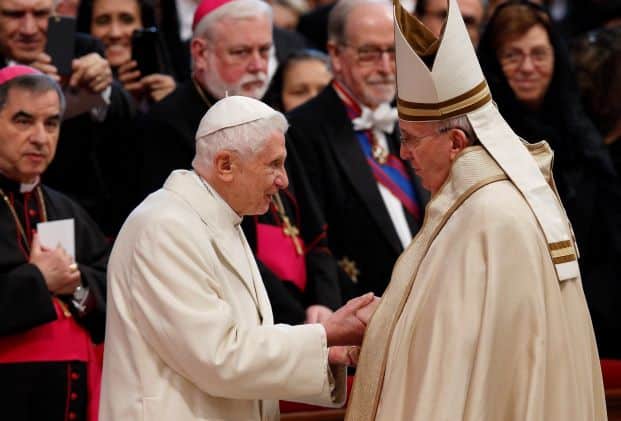VATICAN CITY (CNS) – The theological writings and papal teaching of the late Pope Benedict XVI were and will continue to be a blessing to the Catholic Church, Pope Francis wrote.
“Benedict XVI’s thought and magisterium are and always will remain fruitful because he knew how to focus on the fundamental references of our Christian life: first of all, the person and the word of Jesus Christ, as well as the theological virtues, namely charity, hope and faith,” the Pope wrote in the introduction to a new book.
The Vatican publishing house described the book “Dio è Sempre Nuovo”, (“God is Ever-New”), as a collection of the “spiritual thoughts” of the late pope, “an anthology of the principal themes of the Christian faith in the words of Pope Benedict XVI”.
The book was edited by Luca Caruso, communications officer for the Joseph Ratzinger-Benedict XVI Vatican Foundation, and was scheduled for release on January 14. The Vatican published Pope Francis’ introduction on January 4.
Pope Francis’ highest praise for theologians always has been that they “do theology on their knees” in prayer and with love for the Church.
“Benedict XVI did theology on his knees”, the pope wrote in the book’s introduction. “His explanation of the faith was carried out with the devotion of a man who has surrendered all of himself to God and who, under the guidance of the Holy Spirit, sought an ever-greater participation in the mystery of that Jesus who had fascinated him from his youth.”
The new book’s title, Pope Francis said, “expresses one of the most characteristic aspects of my predecessor’s magisterium and vision of faith: yes, God is always new because he is the source and reason for beauty, grace and truth”.
“God is never repetitive, God surprises us, God brings newness,” the pope wrote, and the “spiritual freshness” of the late pope’s writings confirms those affirmations “with intensity”.
Pope Benedict, he said, offered all Christians a model showing how “heart and reason, thought and affection, rationality and emotion interact” in both living and explaining the power of the Gospel.
The selected quotations, Pope Francis said, offer “a sort of ‘spiritual synthesis’ of Benedict XVI’s writings”, and demonstrate “his ability to show the depth of the Christian faith ever anew”.
Quoting just six words of the late pope – “God is an event of love” – is enough to do “full justice to a theology that always shows the harmony between reason and affection”, the Pope said.
Another book about the late pope also was scheduled for release in January.
The Italian publisher Piemme announced it would publish on January 12 a book, “Nient’altro che la Verità” (“Nothing but the Truth”) by the late pope’s longtime personal secretary, Archbishop Georg Gänswein.
Matteo Bruni, director of the Vatican press office, said on January 4 that he had not spoken to the archbishop about the book so could not say if the publisher’s description was hype or reflected the contents of the book.
Piemme had said that with the death of Pope Benedict, “the time has come” for the archbishop “to tell the truth about the blatant calumnies and dark manoeuvres that tried in vain to cast shadows on the German Pontiff’s magisterium and actions.”
Photo: Retired Pope Benedict XVI and Pope Francis exchange greetings at the conclusion of a consistory at which Pope Francis created 20 new cardinals in St. Peter’s Basilica at the Vatican Feb. 14, 2015. (CNS photo/Paul Haring)

The social injustice today that is
the greatest injustice is that of global
abortion, which is around 45,000,000
per year. This can be traced to the activity
of the American Humanist, who in the
Humanist conference in Asilomar California,
in 1966, passed a motion for elective abortion.
Colorado then became the first US state to
legalise abortion, which spread world wide.
Humanist Joseph Fletcher is known to have pioneered
in the field of situation ethics, which contains
relativism, positivism, personalism, pragmatism.
Fletcher was a leading academic proponent of
abortion, infanticide, euthanasia, eugenics,
and cloning.
Relativism denies the existence of absolute values,
and so denies moral absolutes.
Benedict XVI wrote of a “peculiar Western self hatred
that is nothing short of pathological.” He warned as
Cardinal that the “DICTATORSHIP of relativism” was too often
regarded “the only attitude that can cope with
modern times”. [emphasis mine]. [Aust, Editorial, 3/1/23]
Pope St John Paul II also wrote of positivism as lacking both
God and soul [“Crossing the threshold of hope”].
The correct path for Catholics is made ever clearer by both
of these Pontiffs, who dialogued each week at an arranged
lunch.
The trap of “falling into line” by Catholicism as it sides with
the social left is to ignore the error of relativism, and with
this the white anting of moral absolutes, which are enhanced
by Sacraments. This means being Catholic in name only while
at the same time tacitly supporting an apostasy [Secular Humanism].
Here Benedict XVI, spoke out strongly at a time when SH
was entering in devout Catholic circles.